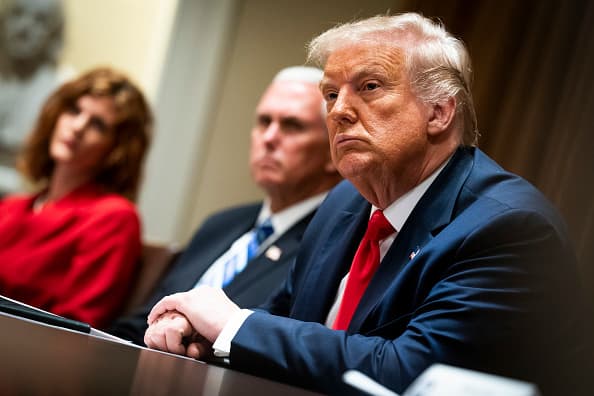President Donald Trump in the Cabinet Room of the White House on Aug. 3.
Doug Mills-Pool/Getty Images)
President Donald Trump is “ready to send” more coronavirus stimulus money.
But it remains unclear if that is enough to move stalled Congressional negotiations forward so that Americans can see more money in their pockets.
On Friday, Trump posted several tweets with one key message: “Democrats are holding this up!”
In the tweets, he addressed direct payments to families, which would amount to $3,400 for a family of four; additional Paycheck Protection Program funds to small businesses affected by the shutdown; money for state and local governments, so that they can save jobs of firefighters, police officers, first responders and teachers; funding for states to open schools safely; and payments for rental assistance.
It is not clear if the president’s tweets will be enough to dislodge the political stalemate, which could last until September now that Congress is not in session and both parties are set to hold their national conventions in the coming weeks.
Lawmakers on both sides of the aisle seem to be in agreement on the additional stimulus checks and small business funding. Money for state and local governments has been a sticking point in negotiations between the parties. Democrats want to fund state and local governments, while some Republican lawmakers have dug in their heels on providing the money.
Democrats are willing to spend more than $3 trillion on a new bill, while Republicans have said they want to keep the total cost down to about $1 trillion.
“On the back of the envelope, that’s at least $1 trillion right there,” Bill Hoagland, senior vice president at the Bipartisan Policy Center, said of the priorities Trump mentioned in his tweets.
Trump needs Congress to authorize the aid spending, Hoagland said. The executive orders he signed last weekend including extended unemployment insurance was possible because they were categorized as disaster rather than regular payments.
Key details, including who will get those unemployment benefits and when, are still unknown.
Millions of Americans will also have to wait for second stimulus checks, which both sides of the aisle have indicated they want, but would need to pass legislation in order to put in motion.
The second round of payments would likely be similar to the first checks, which were $1,200 per individual or $2,400 per married couple, plus $500 for eligible dependents. Some changes have been proposed, including raising the dependent pay to $1,000 or $1,200 per person, raising the cap on the dependent eligibility age, and making it so that Americans who filed jointly with non-citizen spouses (those without Social Security numbers) would still get the money.
But action on that may not happen until September, when Congress also has to address appropriations for fiscal year 2021, which begins in October. A delay on that would prompt a partial government shutdown.
“I cannot imagine any way in which Republicans or Democrats want to have a government shutdown a month out from the election,” Hoagland said.
The stimulus aid could get taken up in a continuing resolution, he said.
Meanwhile, Americans who are counting on more financial help will have to wait, Hoagland said. That’s as Trump’s executive order did little to prevent evictions and details of how the new extended unemployment benefits will be paid on a federal and state level is still getting sorted out.
“I think there’s going to be some people that are going to be hurting between now and September,” Hoagland said. “Come Labor Day, there’s going to be a lot of angry people.”
If Congress signs off on the stimulus checks in September, Americans may have to wait until October or later to receive the money.
More from Personal Finance:
Trump wants stimulus checks to be more than $1,200
How HEALS Act stimulus checks would be different
How soon you can expect another stimulus check in the mail
“Politically, some of the people in the White House might think it’s a good thing to get a check signed by Donald Trump right before the election,” Hoagland said.
This time around, deploying millions of $1,200 payments will likely be easier for the IRS, which means people could receive the funds more quickly, said Kris Cox, senior tax policy analyst at the Center on Budget and Policy Priorities.
“Despite decades of funding cuts, the IRS impressively got stimulus payments out the door within weeks of the CARES legislation passing,” Cox said. “We expect the IRS is anticipating a second round and they’re ready and equipped to get money out the door quickly.”
But that depends on lawmakers coming back to the negotiating table and agreeing, she said.
